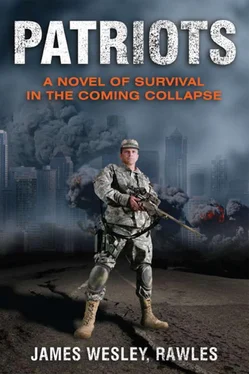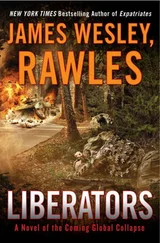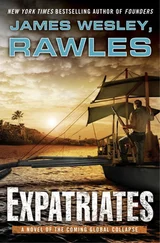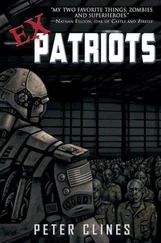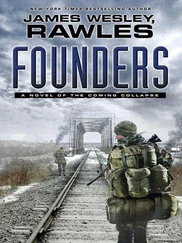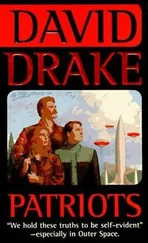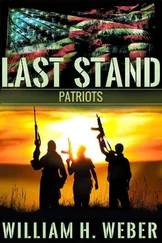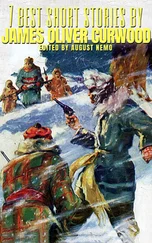There were no other vehicles in sight. Kuntzler weighed his alternatives.
There was no radio in the Humvee. Due to lack of maintenance facilities, radios were a scarce item reserved for command posts and maneuver units.
Rather than wait where they were until help arrived, and perhaps risk contact with a resistance patrol, he decided that they would hike back to the security checkpoint at the outskirts of Moscow. It was just two kilometers away.
His guards put on their gloves and then their woodland pattern Gore-Tex over their M65 field jackets. The Gore-Tex coats had brown “bear suit” cold weather liners. Kuntzler was wearing just his fleck pattern field coat. He wished that his coat had a liner, and a hood like the Gore-Tex. Since today was to be a liaison visit rather than a field operation, he was wearing his sky blue UN beret.
His ears started getting cold soon after he stepped out of the Humvee. They had walked slowly, carefully eyeing the ground for evidence of mines.
They had already spread out to a safe interval. Just as Kuntzler passed a telephone pole, there was an explosion. His sensations were overwhelmed. There was a roar of gunfire. A horrible burning sensation stung his face, his eyes, his mouth. For a few moments, he couldn’t breathe. He fell to the ground gasping.
His eyes were full of tears, and he couldn’t see. He heard shouts and loud footsteps. He was kicked hard once in the testicles. The MP-5 submachinegun was simultaneously ripped from his hands. Then he was quickly handcuffed, searched, and blindfolded. His eyes were tearing uncontrollably and his sinuses were dripping heavily. Kuntzler heard more men shouting, and barking dogs.
Within minutes, he was bound hand and foot and strapped onto a dogsled. He heard a man yell, “ Vive la Maquisards !” as the sled pulled away. Kuntzler had no idea which direction the sled was traveling.
The ambush had been set up forty-five minutes before. The ambushers hid in the clumps of grass and snowdrifts, sixty yards back from the road. They had placed five toe poppers in the northbound lane of the road. They were staggered slightly, so at least one of them would be run over by a tire. Next, they buried a plastic baggie filled with a half-pound of CS powder that they had extracted from a Smith and Wesson riot control grenade. The baggie was buried just beneath the snow on the west side of the road. A one-third stick of dynamite with a blasting cap was wired directly below it.
The ambush went almost exactly as planned. The Humvee arrived ten minutes after their intelligence source said it would. They had hoped that after hitting the mine it would roll completely over, but lying at a 35-degree angle in the ditch was good enough. It wasn’t going anywhere. Within a few minutes, the soldiers were out of the stranded Humvee and approached the kill zone on foot. Two of the soldiers carried M4 carbines. Using a locking cable release, Jeff switched on the tripod-mounted video camera to record the action. He waited until his intended target—the man with the different style uniform and the briefcase—was a pace in front of the CS mine. Then Jeff Trasel command-detonated it with a Claymore clacker. Tony, Teesha, Ian, and Mary hosed down the three guards. Their target was overwhelmed by the cloud of CS powder and was easily subdued. Lawrence Raselhoff and his Moscow Maquis came out of the tree line just as planned, just after the shooting stopped. One dogsled headed straight to the ambush site. The other carried a Maquisard to search the Humvee.
At first, they were all elated by the fact that they had captured so many fine weapons and night vision devices. They didn’t realize it until later, but they had also just captured some very important documents and the man who would become the most valuable intelligence asset in the Pacific Northwest theatre of operations.
• • •
The UN Regional Administrator was angry. Reginald Snodgrass had a reputation for having a bad temper. On two occasions he had carried out summary executions right in his office, with a revolver. When he was mad, he didn’t care if he made a mess. Someone else always cleaned it up. His staff tried to find things to keep themselves busy and away from the building on his “bad hair days.” In this instance, he was angry because he didn’t like having to leave his warm office in the dead of winter. He much preferred having people come to his office in Lewiston for meetings, where he felt secure.
This particular meeting was to be held at the abandoned town of De Smet, nineteen miles north of Moscow. Granted, it was a convenient central location for the commanders of the garrison forces and the civilian authorities from Coeur d’Alene, Lewiston, Moscow, Pullman, Kellogg, Sandpoint, and Saint Maries to meet. But Reggie didn’t like the meeting spot. One of his advisers had been ambushed within earshot of Moscow, just five days before. Anything outside the city limits of Moscow was bandit country, in his book.
Despite his reservations, Snodgrass realized that he had to be at the meeting. Word had it that heads would roll. Not only was he expected to be there but he wanted to see the fun when they started pointing fingers. Since he was a civilian UN Administrator, and the problem at hand was strictly one of military security, he knew the fingers wouldn’t be pointed at him. As a ten-year veteran of British civil service before he joined the UN, Reggie Snodgrass knew how those games were played. He grumbled to his aides about the weather as they all loaded up. At least they had the privilege of traveling to the meeting in a well-heated APC.
The meeting itself was held in the front parlor of the old De Smet mission building. It was situated on a hill, with a broad circular driveway. When Snodgrass and his staff arrived, ten minutes before the scheduled start time, there was already a roaring fire going in the fireplace. Coffee, brandy, and finger foods were served before the meeting got started. These niceties and the inevitable ensuing chatter delayed the start of the briefings for twenty minutes.
The meeting was a big event, just as Snodgrass expected. Even the Second Corps commander and his staff were there. It was what theYank soldiers called “a big dog and pony show” or “a real goat rope.” Reggie loved American colloquial terms. Outside, there were two tanks and more than thirty APCs—an assortment of BTRs, BMPs, Marders, and Bradleys—in a semicircle around the mission grounds. Most of the large security detachment was ordered to stand outside their vehicles so that there would be no chance of infiltrators escaping their gaze and slipping through the perimeter. There were also roadblocks set up on all four approaches to town. The security arrangements had been planned more than a week in advance. Realizing that a gathering of commanders would be a tempting target, nothing was left to chance. Engineer Corps personnel spent three chilly days searching the building and grounds for bombs, using both bomb-sniffing dogs and metal detectors.
The first briefing was a general situation overview. It was given by Colonel Horst Blucher, G2 of the UNPROFOR Second Corps. Other, more detailed briefings were scheduled for later in the morning. Blucher was a tall angular man with a booming voice. Standing before an acetate-covered map board and holding a retractable pointer, he read from prepared notes. “Zuh security situation in western Montana, northern Idaho, and eastern Washington is very much worsening. In northern Idaho, our Second Corps has, to date, killed 295 terrorists, and captured 17. These latters, of course, have all been thoroughly interrogated and dispatched. An additional 172 troublesome civilians, all deemed potential security risks and/or politically unreliable and/or possible resistance sympathizers, have been transported to zuh work and rehabilitation camp at Gowen Field.
Читать дальше
